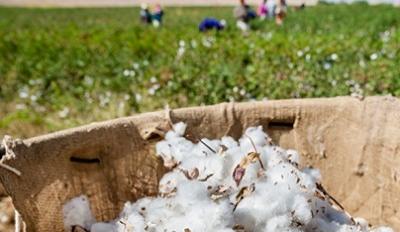
For the first time in years, public sector workers were not forcibly mobilized to plant and weed cotton in Uzbekistan in spring 2018, although serious structural problems in the cotton sector threaten to undermine this development. The Uzbek-German Forum, a Cotton Campaign member, released these findings in a report published today. The 10-page report, “’We want farmers to have full freedom’: No Need for Forced Labor when Farmers are Empowered to Pay Decent Wages: Spring Cotton Fieldwork 2018,” is based on 270 interviews with farmers, public sector employees, labor union officials, local government and the local neighborhood council – the mahalla officials, as well as visits to cotton fields, public sector institutions, banks, markets, and government agencies in 6 regions and the republic of Karakalpakstan in Uzbekistan in May to July 2018.
“The shift from mobilization of workers in education and healthcare institutions to mostly voluntary labor to prepare fields is significant and should be commended, but serious structural problems remain,” said Umida Niyazova, UGF executive director. “Farmers are required to produce cotton by the state, often at a loss, and face crippling penalties if they don’t meet their quotas.”
Spring cotton fieldwork, including field preparation, planting, thinning, weeding, and topping, starts in April or early May, depending on the region, and can last several months. It requires fewer workers than the annual cotton harvest, which typically takes place from early September through early November each year. According to the International Labour Organization Third-Party Monitoring estimate, hundreds of thousands of Uzbekistan citizens were forced to pick cotton under threat of penalty, during the 2017 harvest.
Farmers credit an increase in the cotton procurement price (the price set by the government at which farmers are required to sell their crop to the government) and ability to access cash to pay for inputs, with their ability to pay for voluntary spring labor in 2018. However some farmers said the amounts allocated were not sufficient to attract voluntary labor and they covered the costs of spring fieldwork from their own resources. Farmers and local administrators alike are still bound by government-imposed quotas for cotton production. Penalties for missing those quotas can be severe, including physical violence and loss of land. One farmer said, “The prosecutor screams, ‘Quickly plant cotton,” threatening ‘or else I’ll have a criminal case against you.’ Is there any possibility that they will not interfere in our affairs? Is there really no possibility to give us some freedom?”
“What happens during the 2018 harvest is going to be an important sign of how seriously the government of Uzbekistan takes its obligation under international law to end the use of forced labor in the cotton sector,” said Judy Gearhart, Executive Director of the International Labor Rights Forum, a founding member of the global Cotton Campaign. “We have seen an important rhetorical commitment to ending forced labor, but the continuing use of public sector employees for forced labor in other sectors, such as construction and street cleaning, shows that much work remains to be done to end, prevent, and punish the use of forced labor.”
Ongoing forced labor outside the cotton sector is the subject of a forthcoming report by the Uzbek-German Forum and the Solidarity Center.
The government of Uzbekistan has made public high-level commitments to end forced labor in cotton production. This includes a directive from President Shavkat Mirziyoyev to the prime minister to take necessary measures to ensure that no workers in the public sectors participate in cotton production. Some forcibly mobilized cotton pickers were ordered back from the fields during the 2017 harvest after World Bank President Jim Yong Kim urged Mirziyoyev to address forced labor, but many of those were extorted to pay for replacement workers or eventually returned to the fields.
“A decade of international pressure from governments, companies, civil society and others has been successful in motivating the Uzbek government to acknowledge the problem and begin to initiate reforms,” said Patricia Jurewicz, founder and vice president of the Responsible Sourcing Network. “Close, independent monitoring of the 2018 harvest is needed to see how far the government’s commitments have actually contributed to ending forced labor in Uzbek cotton production, and what actions still need to occur.”
The Cotton Campaign developed a roadmap with steps for the government of Uzbekistan to follow to dismantle the forced labor system of cotton production, which was presented to government officials during high-level meetings in Tashkent in May 2018.
The Cotton Campaign is a global coalition of human rights, labor, investor and business organizations dedicated to eradicating child labor and forced labor in cotton production.

